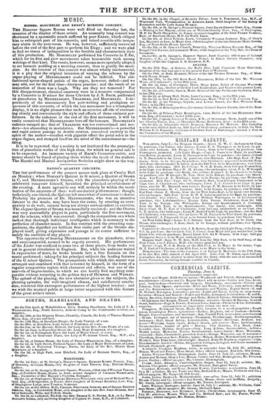MUM
MESSRS. SIOSCHELES AND ERNST'S MORNING CONCERT.
TME Hanover Square Rooms were well filled on Saturday last, the occasion of the display of these artists. An unusually long concert was shortened by a spasmodic attack suffered by poor ERNST, which obliged him to relinquish part of his concerto, and raised considerable tempo- rary alarm in the ante-room. He was, however, sufficiently recovered before the end of the first part to perform his Elegy ; and we were glad to find no_traces of indisposition in the forcible and characteristic style of this production. Mr. MOSCHELES performed his Concerto in E flat, which for its first and slow movements takes honourable rank among writings of that kind. The rondo, however, seems more specially adapted to set bonnets nodding at a morning concert, than to gratify the musi- cian. As the interest of this concert was almost wholly instrumental, it is a pity that the original intention of varying the scheme by the organ-playing of MENDELSSOHN could not be fulfilled. The old- fashioned spoon-shaped pedals of the organ, however, defied—and we may add, not for the first time—German practice; and the result of an inspection of them was a laugh. Why are they not removed For this disappointment, classical amateurs were in a measure compensated by a Concerto in D minor for three Claviers by J. S. BACH, performed on pianofortes by MENDELSSOHN, THALBERG, and MOSCHELES. Inde- pendently of the uncommonly fine part-writing and prodigious se- quences of this concerto, of which the last movement has a triumphant display, it is no slight pleasure that such an occasion affords of contrast- ing closely and conveniently the style and effects of three eminent per- formers. In the cadences at the end of the first movement, it will he easily conceived that MENDELSSOHN bore off the honours. MOSCHELES'S cadence escaped us ; that of THALBERG was too conventional and mo- dern—too abounding in modulation. But MENDELSSOHN'S—a powerful and rapid unison passage in double octaves, conceived entirely in the spirit of the author—recalled with gigantic effect the pedal solos in the organ-fugues, and stamped itself on the mind of the connoisseur as—the thing.
It is to be regretted that a society is not instituted for the promulga- tion of pianoforte works of this high class, for which no general sale is to be expected. An immense variety of Bson's Concertos exists, and means should be found of placing them within the reach of the student. The Handel and Musical Antiquarian Societies might show us the way.


























 Previous page
Previous page